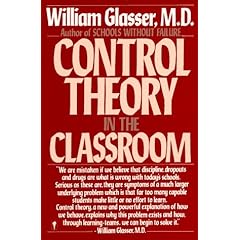 In the interest of improving my young and inexperienced use of classroom management methods, I recently read about William Glasser's control theory in his book (so cleverly titled) Control Theory in the Classroom.
In the interest of improving my young and inexperienced use of classroom management methods, I recently read about William Glasser's control theory in his book (so cleverly titled) Control Theory in the Classroom.Control theory, for those who are unfamiliar with it, basically states that all people are driven by five primal needs:
- to survive and reproduce
- to belong and love
- to gain power
- to be free
- to have fun
His solution in this book is to use "learning-teams" based on the cooperative learning model of Johnson and Johnson. This is group work where each member is given a specific task in the group. The students work together to complete a task - preferably one that lends itself to group work (ie not memorizing vocabulary words as a group, rather, each group taking one vocabulary word and developing and presenting a visual mnemonic and semantic map that links the new word to familiar ones). The goal is for the teacher to provide structure the students can build upon, giving them some power to decide where they will go with it.
I am all about group work. Group work is the foundation of my educational philosophy. But if there's one thing that always made me feel silly as a student, it was being given the title "Encourager" in group work. That may sound like a trifle of a thing to be concerned about, but I don't think students need titles to complete specific tasks. I think it is belittling.
One way around this is to give titles that relate somehow to the assignment. One educator had an assignment where students participated in a computer simulation of 15th century sea exploration. In the group there was a captain, quartermaster, mate, and (unfortunately) encourager. The first three titles make better sense.
Control theory can be applied more widely, and that's how I intend to use it the most. While it is certainly a balancing act, I think that there is a group of students who act up because they don't have enough control over their own actions and grades in class. Traditional forms of assessment not only focus too much on the lower three levels of Bloom's Taxonomy, but in them the teacher chooses the questions and decides how the student will be graded. Students assessed with traditional methods shut down - they don't have power over their destiny and so they think "why bother?" Alternative forms of assessment, where a student can pick large parts of their assignment from a list, or create their own final project, assess a student's ability to apply, synthesize, and evaluate knowledge, and gives them greater control and power over their learning and their grade.

Do you have a follow up to this article? What have you learned using this form of classroom management?
ReplyDeleteWhile you speak to Bloom"s Taxonomy and how students are generally only being introduced to the lower 3, which don't get into HOTS- have you considered Anderson's Taxonomy which is the "updated" Bloom?
ReplyDelete